Related Research Articles
Edward Test Wallace was a veteran of the Mexican–American War. He was also a participant in the Union Army during the American Civil War (1861–1865). Before the war he lived for a time in Mattoon, Illinois where he worked as a tinner at a hardware store. At the outset of the civil war, Wallace was captain in the 11th Indiana Infantry Regiment. Later, he was acting aid for his brother, General Lew Wallace at the Battle of Shiloh and later as Volunteer Aide-de-Camp for his brother at the defense of Cincinnati, Ohio. At the end of the war he was a captain in the Veteran Reserve Corps.

Daniel F. Desdunes was a civil rights activist and musician in New Orleans and Omaha, Nebraska. In 1892 he volunteered to board a train car designated for whites in violation of the Louisiana 1890 Separate Car Act. This would be a test case to enable the New Orleans Comité des Citoyens to challenge the law in the courts. The train he boarded was an interstate train, and the court found that the law did not apply to such cases, which were bound by federal law and regulation. Shortly thereafter, another member of the Comité des Citoyens, Homer Plessy, was selected to board an intrastate train. He was arrested for refusing to leave the white car, and what became known as Plessy vs Ferguson (1896) was litigated to the US Supreme Court.

Edwin R. Overall aka Edwin R. Williams was an abolitionist, civil rights activist, civil servant, and politician in Chicago and Omaha. In the 1850s and 1860s, he was involved in abolition and Underground Railroad activities headed at Chicago's Quinn Chapel AME Church. During the U. S. Civil War, he recruited blacks in Chicago to join the Union Army. After the war, he moved to Omaha, where he was involved in the founding of the National Afro-American League and a local branch of the same. He was the first black in Nebraska to be nominated to the state legislature in 1890. He lost the election, but in 1892, his friend Matthew O. Ricketts became the first African-American elected to the Nebraska legislature. He was also a leader in Omaha organized labor.
Cyrus Dicks Bell was a journalist, civil rights activist, and civic leader in Omaha, Nebraska. He owned and edited the black newspaper Afro-American Sentinel during the 1890s. He was an outspoken political independent and later in his life became a strong supporter of Democrats. He was a founding member of the state Afro-American League and frequently spoke out against lynchings and about other issues of civil rights.
W. H. C. Stephenson was a doctor, preacher, and civil rights activist in Virginia City, Nevada, and Omaha, Nebraska. He was probably the first black doctor in Nevada and worked for the rights of blacks in that city. He was noted for his efforts in support of black suffrage in Nevada at the passing of the Fifteenth Amendment in 1870. He helped found the first Baptist church in Virginia City. He moved to Omaha in the late 1870s and continued his medical, religious, and civil rights work. He founded another Baptist church in Omaha, and was a prominent Republican and activist in the city.
William R. Gamble was a civil rights activist and barber in Lincoln, Nebraska and Omaha, Nebraska. Gamble was born a slave in Mobile, Alabama in about 1850. His wife, Eveline, had French-Canadian and Native American ancestry. They were married in Lincoln, Nebraska in 1873 and moved to Omaha, Nebraska around 1880. They had eight children. Gamble's oldest daughter Lucinda became Omaha's first black school teacher and eventually married Father John Albert Williams, serving as an active community leader in North Omaha throughout her life. His other children were William, Richard Joseph, Edward, Leonard, Fred, Mary, and George. Gamble died on April 16, 1910.

Robert James Harlan was a civil rights activist and politician in Cincinnati, Ohio in the 1870s-1890s. He was born a slave but was allowed free movement and employment on the plantation of Kentucky politician James Harlan, who raised him and may have been his father or half-brother. He became interested in horse racing as a young man and moved to California during the 1849 Gold Rush where he was very successful. In 1859 he moved to England to import racehorses from America and race them in England. He returned to the United States in 1869 during reconstruction. He became friends with Ulysses S. Grant and became involved in Republican politics. For the rest of his life, he was involved in city, state, and national African-American civil rights and political movements. In 1870 he became colonel of the Second Ohio Militia Battalion, a black state militia battalion in Cincinnati. In 1886, he became a member of the Ohio House of Representatives.

Freeman H. M. Murray was an intellectual, civil rights activist, and journalist in Washington D.C. and Alexandria, Virginia. He was active in promoting black home-ownership, opposing Jim Crow laws and lynching, and supporting positive representation of African Americans in public art. He was a founding member of the Niagara Movement and was an editor of its journal, the Horizon, along with W. E. B. Du Bois and Lafayette M. Hershaw. Alongside his other work, Murray was an important intellectual leader and wrote an influential book of art criticism. In this, Murray was one of the first historians of African American art. His work expressed a desire that art take seriously the representation of African Americans and that slavery not be overlooked in favor of representation of heroes and glory in public art.
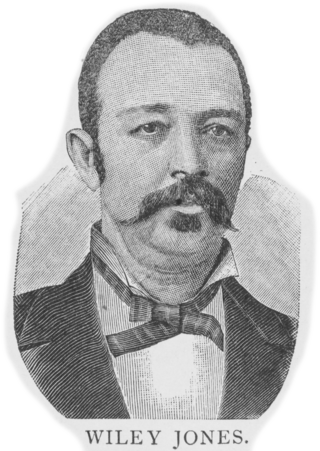
Walter "Wiley" Jones was a businessman in Pine Bluff, Arkansas, who was one of the wealthiest African-Americans in his state. He owned the first streetcar company in Pine Bluff and a park in the city which housed the fairgrounds. A devotee of horse racing, he owned stables and a race track on the park grounds. He also owned a saloon. He was active in civic affairs and was an advocate for civil rights.

James Preston Poindexter was an abolitionist, civil rights activist, politician, and Baptist minister from Columbus, Ohio. He was born in Richmond, Virginia and moved to Ohio as a young man. In Ohio he was a part of abolitionist and Underground Railroad societies and became a Baptist preacher. From the pulpit, he preached against slavery and for African-American rights. After the American Civil War (1861–1865), he was involved in political activities in Columbus, serving on the City Council, the city Board of Education, the state Forestry Bureau, and as trustee of the Institute for the Blind and of Wilberforce University. At his death, he was noted as the second longest serving advocate for African American rights after Booker T. Washington.
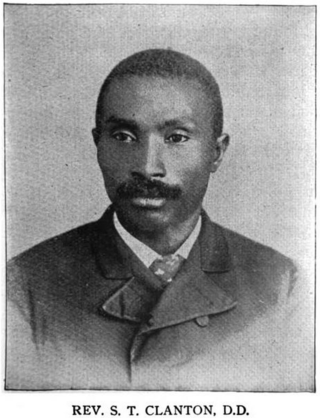
Solomon T. Clanton was a leader in the Baptist Church. He was educated in New Orleans and Chicago and became the first black graduate of the theological department at the Baptist Union Theological Seminary at Morgan Park, Chicago, Illinois, associated with the University of Chicago. He spent his career as an educator and leader in the Baptist Church. He served as a professor at Leland University, Alabama A&M University, and Selma University, and before his death as assistant librarian at the University of Chicago. He was acting president for a short time at Alabama A&M and was dean of the theological department at Selma University. During his career, he was also an educator in high schools and Sunday schools.
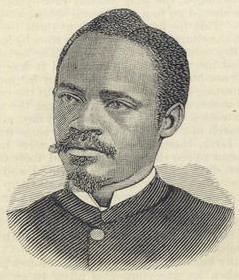
Emanuel K. Love was a minister and leader in the Baptist church from Savannah, Georgia. He was pastor of one of the largest churches in the country and was a prominent activist for black civil rights and anti-lynching laws. He played an important role in establishing separate black Baptist national organizations and advocating for black leadership of Baptist institutions, especially schools.
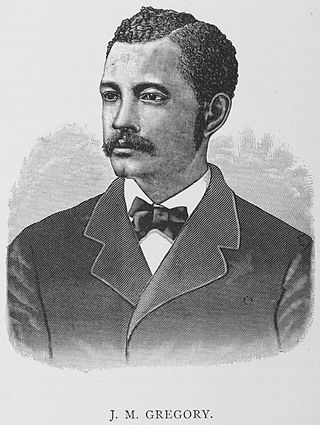
James Monroe Gregory was a Professor of Latin and Dean at Howard University. During the American Civil War, he worked in Cleveland for the education and aid of escaped slaves. He initially attended Oberlin College. He transferred to Howard and was the valedictorian of Howard's first graduating class in 1872. He then became a member of faculty, where he served until the late 1880s. During that time he was active in civil rights, particularly related to the education of African American children. He fought to desegregate Washington, D.C., schools in the early 1880s and participated in the Colored Conventions Movement and was a delegate to the 1892 Republican National Convention. In 1890, he founded the American Association of Educators of Colored Youth. In 1893, he published a biography of Frederick Douglass. In 1897, he was removed at Howard and moved to New Jersey where he became principal of Bordentown Industrial and Manual Training School.

William Q. Atwood was a lumber baron in Saginaw, Michigan. Born a slave in Alabama, he was freed in 1853 in the will of his white master and father, and moved to the free state of Ohio. He became active in the Underground Railroad in Ripley, Ohio. During the American Civil War, Atwood moved to the northwest, settling in East Saginaw, Michigan in 1863. There he became successful in real estate and lumber dealing.

William V. Thompson was an American professional and champion tenpin bowler. He was the proprietor of Plaza Bowling Alley in the Chicago Plaza Hotel, the first official regulation ten-pin bowling alley. He formed a bowling club from champion bowlers and challenged other organizations across the nation. Thompson was influential in forming of the ultimate sanctioned regulations rules of the game and an advocate of the original American Bowling Congress. He was general manager of the department at Brunswick-Balke-Collender Company that made the bowling equipment for the alleys.
John Hudson Riddick was an educator, community leader, and minister in the African Methodist Episcopal (AME) church. In 1872 he was elected a member of the Norfolk, Virginia, city council. He was an AME minister at a number of churches and a leader in the Washington and Delaware Conferences of the church.
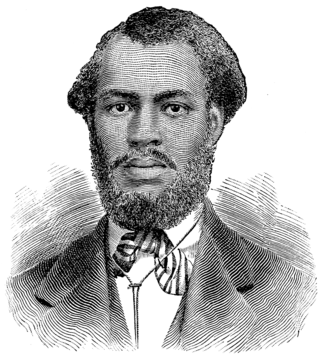
Marshall W. Taylor was a Methodist Episcopal minister and journalist in Kentucky. He is noted for his book, Collection of Revival Hymns and Plantation Melodies published in 1882. He was also the first black editor of the Southwestern Christian Advocate, a position he held from 1884 until his death in 1887.
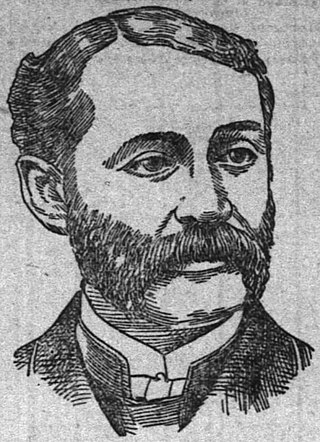
James Matthew Townsend was an African Methodist Episcopal (AME) minister and a state legislator from Indiana. A Republican, he served in the legislature in the 1884 session. From 1889 to 1891 he was recorder at the General Land Office in Washington, D.C., appointed by President Benjamin Harrison.

Irvine Garland Penn was an American educator, journalist, and lay leader in the Methodist Episcopal Church. He was the author of The Afro-American Press and Its Editors, published in 1891, and a coauthor with Frederick Douglass, Ida B. Wells, and Ferdinand Lee Barnett of The Reason Why the Colored American Is Not in the World's Columbia Exposition in 1893. In the late 1890s, he became an officer in the Methodist Episcopal Church and played an important role advocating for the interests of African Americans in the church until his death.

John Grant Pegg was a political and civil leader in Omaha, Nebraska. He was a leader in the local African-American community and was the city inspector of weights and measures from 1906 until his death in 1916.
References
- 1 2 3 Simmons, William J., and Henry McNeal Turner. Men of Mark: Eminent, Progressive and Rising. GM Rewell & Company, 1887. p792-793
- 1 2 Former Slave Dies at 101, The Indianapolis News (Indianapolis, Indiana) March 2, 1909, page 10, accessed December 8, 2016 at https://www.newspapers.com/clip/7773403/former_slave_dies_at_101_the/
- ↑ Porter's father's name is given as Troy in the 1909 obituary of Winnie and John on Porter's 1929 death certificate.
- ↑ [No Headline], The Indianapolis Leader (Indianapolis, Indiana) June 17, 1882, page 4, accessed December 8, 2016 at https://www.newspapers.com/clip/7772990/no_headline_the_indianapolis_leader/
- ↑ Seek Their Rights, The Inter Ocean (Chicago, Illinois) October 21, 1895, page 3, accessed December 8, 2016 at https://www.newspapers.com/clip/7773134/seek_their_rights_the_inter_ocean/
- ↑ Delegates to Omaha, The Appeal (Saint Paul, Minnesota) January 8, 1898, page 1, accessed December 8, 2016 at https://www.newspapers.com/clip/7773162/delegates_to_omaha_the_appeal_saint/
- ↑ Dunne Names Negro Congress Delegates, Chicago Daily Tribune (Chicago, Illinois) June 20, 1914, page 10, accessed December 8, 2016 at https://www.newspapers.com/clip/7773429//
- ↑ Indiana State Board of Health. Death Certificates, 1900–2011. Microfilm. Indiana Archives and Records Administration, Indianapolis, Indiana. accessed at Ancestry.com. Indiana, Death Certificates, 1899-2011 [database on-line]. Provo, UT, USA: Ancestry.com Operations, Inc., 2015.